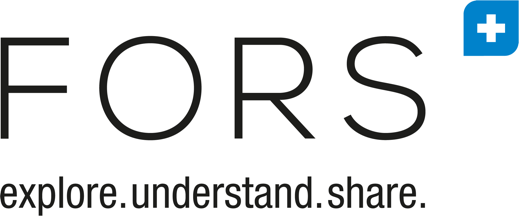Policies
SWISSUbase, the online platform from FORS provides access to research information and data and offers researchers the opportunity to easily document and deposit their research data (both quantitative and qualitative) for long-term preservation and dissemination. With this key tool and related support services, FORS promotes and facilitates research transparency as well as data sharing and reuse in Switzerland and Europe.
FORS is also committed to open access to data and publications. Data and publications resulting from research projects at FORS or with the involvement of FORS staff must be accessible on the web for free insofar as allowed by copyright. The benefits of open data for the social sciences include:
- Greater transparency in the scientific process
- More thorough exploitation of existing data and reduced need for new collections
- More rapid pace of discovery
- Greater innovation and dissemination of best practices in research
- Development of new forms of scientific collaboration
Data anonymization. As a general rule, the FORS unit Data Management & Archive Services (DMAS) provides access only to datasets that have been de-identified, including the removal of direct identifiers, such as name and address.
Access eligibility criteria. Access to data (quantitative and qualitative) is restricted to researchers and students affiliated with a university, university of applied science, or research institute. Non-affiliated researchers may still request access, but such requests are carefully evaluated. Access is granted only for research or teaching purposes with sufficient justification for the use of the data.
User contract. Data users may gain access to datasets only after accepting an agreement to use and cite the data in a proper fashion, for scientific research and education within an academic framework, and following typical scientific ethical norms of conduct. To access and download data stored on our online platform, users must be registered with the FORS unit Data Management & Archive Services (DMAS). Registered users must accept the terms and conditions of data use during the data upload process via our online platform.
Data sharing. The FORS unit Data Management & Archive Services (DMAS) also protects certain rights and interests of researchers and data producers who deposit their data via our online platform:
- Data producers retain copyright on the data they provide to DMAS
- Data producers have the right to be informed regularly about the use of the deposited data
- If data are deposited before researchers have published their own analyses, an embargo may be imposed for a specified period of time before the data are shared
- Users of data stored with our service must explicitly cite the source of the data in any publication(s) referring to the data used.
These and other rights are outlined in a contract between the data producer and DMAS. Registered data producers must accept the conditions of the contract during the data submission process via our online platform.
See here for the data protection policy of FORS.
The scope of this preservation policy is limited to the FORS unit Data Management & Archive Services (DMAS). It describes the digital preservation strategies and principles of DMAS, as well as the responsibilities and procedures involved in ensuring adequate preservation of and access to the data held within the archive.

 Bâtiment Géopolis,
Bâtiment Géopolis, +41 (0)21 692 37 30
+41 (0)21 692 37 30

